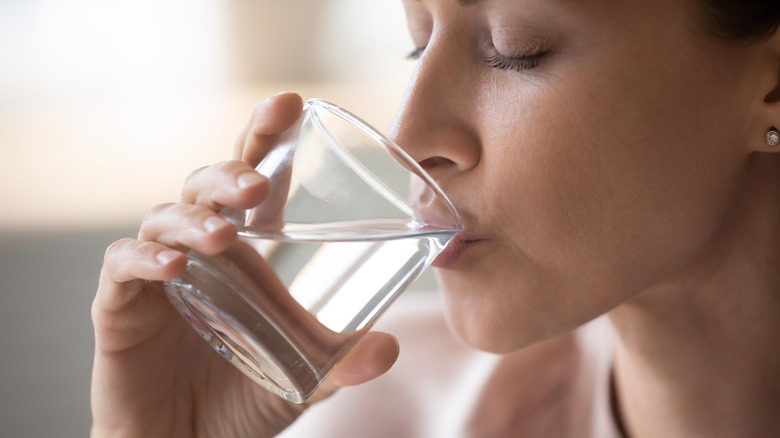Ice Water Versus Hot Water: Which One Is Better To Drink?
Many people have a preference when it comes to how they like their water. Some people enjoy cold water, while others prefer room temperature or even hot water. Since water is essential for our well-being, you may wonder if temperature actually matters beyond mere preference.
It turns out that there are pros and cons to both hot and cold water, and a lot of it depends on your situation. For example, many people have hot drinks after shoveling snow; according to a 2017 study published in the journal Temperature, hot water can help warm up your body. Hot water can also be beneficial if you are sick, as it can potentially alleviate a runny nose, cough, sore throat, and fatigue, according to a 2008 study published in the Rhinology Journal.
If you have achalasia, a disorder that makes it hard to swallow, then hot water may be your best friend. A 2012 study published in the Journal of Neurogastroenterology and Motility looked at 12 achalasia patients and found that hot water helped reduce symptoms, while cold water did the opposite. However, there is a limit to just how hot your water should be. You should never risk burns by drinking scalding water. Another potential drawback to drinking hot water is that many people may drink less of it than if they were drinking cooler water instead, according to a 2013 study published in the International Journal of Clinical and Experimental Medicine.
Cold water may be better for rehydration, but it depends on your preferences
If you are exercising, you may want to turn to cooler water. Multiple studies, including one published in Medicine & Science in Sports & Exercise in 2008, have shown that cold water improves performance and endurance for people who are working out. On the other hand, some people complain of headaches after drinking ice-cold water, as cited in a 2001 study published in the Cephalalgia journal.
A 2013 report published in the International Journal of Clinical and Experimental Medicine concluded that the best water temperature is not ice-cold or hot water, but cool water of about 60 degrees Fahrenheit. The six participants in this study drank more water when their water was cooler than when it was ice-cold or hot.
When it comes to your well-being, what is most important is not the temperature of your water, but whether you are drinking water at all. According to Healthline, drinking water of any temperature can potentially boost your energy and improve your overall functionality. If you personally won't drink much water unless it's a specific temperature, then that temperature is the best for you (per Cleveland Clinic).

